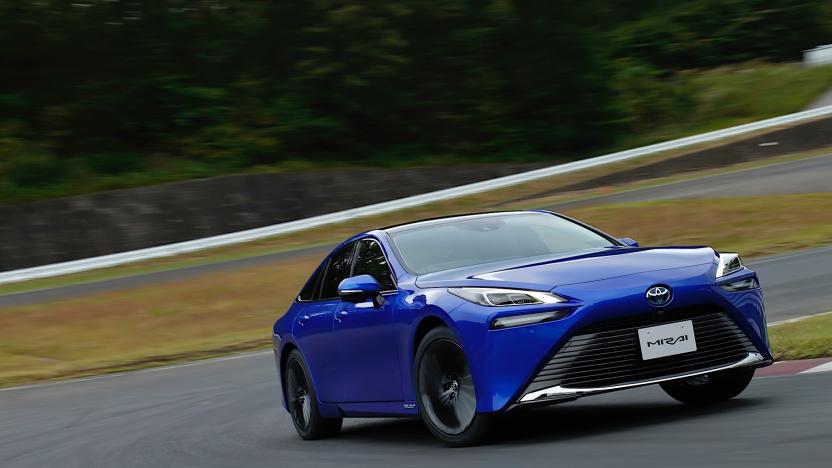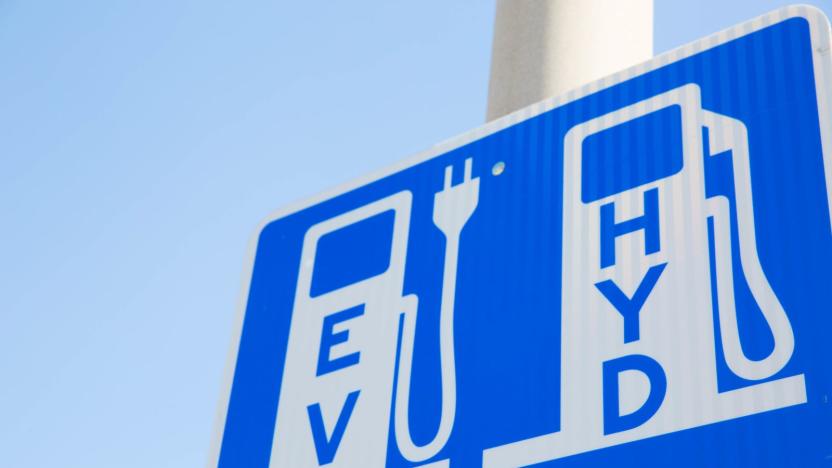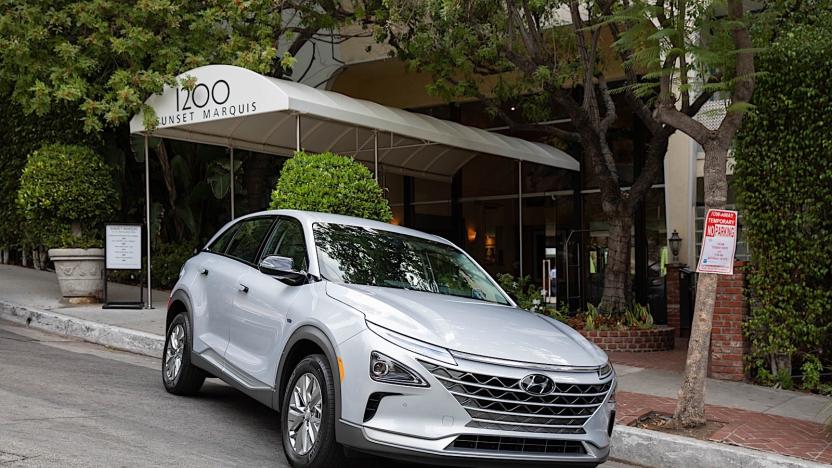FCEV
Latest

Toyota's second-generation Mirai has a 400-mile range
The new hydrogen-powered car can boast of a more efficient fuel cell and longer range, but the same question of refueling won't go away.

Researchers may have found a better way to make hydrogen for cars
While EVs have come a long way -- even Ford is making electric trucks -- they're still a far cry from perfect. One of the biggest complaints is that the batteries need to be plugged in and recharged, and even when they're charged, they have a limited range. Fuel cell electric vehicles offer an alternative. Their "battery" -- actually a hydrogen/oxygen fuel cell -- can be replenished with hydrogen gas. The biggest problem to-date has been that producing hydrogen isn't an environmentally friendly process. We would also need the infrastructure to refuel with hydrogen. But, new technology from UMass Lowell could remove those barriers.

Behind the wheel of Hyundai's Nexo Fuel Cell EV
Electric vehicles have yet to take over the world due to a pair of shortcomings inherent to the technology: limited range and long refueling times. Hyundai's hydrogen-powered 2019 Nexo FCEV addresses both issues -- all while it cleans the atmosphere around you like a giant, driveable Coway Mighty.

FedEx adds a hydrogen fuel cell van to its fleet
Cars are bad for us in pretty much every respect, especially since fossil fuel use contributes around 65 percent of all climate-changing emissions. Since delivery companies zoom around our neighborhoods with diesel-belching vans every day, package vans need to get clean, and fast. It's why FedEx is making a big deal that it's just taken delivery of its first hydrogen fuel cell electric vehicle.

Toyota reportedly working on a hydrogen-fueled Lexus limo
Toyota's first hydrogen car hasn't even gone on sale yet here in the US, and already we're hearing rumors about a follow-up vehicle. According to the Australian website Motoring, the Japanese auto giant is planning on taking the same fuel cell system it used in its mid-range Mirai sedan, and putting it into a higher-end Lexus LS limousine. For the most part, then, the new vehicle will make use of the same technology, though Toyota will apparently have to do some retro-fitting in order to make it work inside the current Lexus LS. (Unlike the LS, the Mirai was built from scratch as a hydrogen car.) If Motoring's report is correct, the new Lexus will have a fuel cell under the front seat, with the hydrogen tanks located behind the rear seat. Also, despite the fact that the LS wasn't originally designed as a hydrogen vehicle, it will reportedly offer nearly the same range as Toyota's existing FCEV: 239 miles, versus 300 on the Mirai. No word yet on price or whether this report is even true. And we suspect it could be a while before anyone sets the record straight -- the hydrogen-fueled Lexus LS is rumored to launch "by 2017," up to two years from now.

What you need to know about hydrogen fuel cell vehicles
Damn the torpedoes (and Teslas)! Two of Japan's biggest automakers are about to make sizable wagers on a different kind of clean fuel tech: hydrogen power. Toyota will launch the $57,500 Mirai fuel cell vehicle (FCV, above) next year, while hydrogen veteran Honda will out a model in 2016. But wait, aren't EVs the last word in green cars? Fuel cell cars are EVs, in a way, but you can fill one up with hydrogen in five minutes rather than waiting hours for a charge. The only way to do that in an electric vehicle (EV) is by swapping the entire battery. So why is there exactly one production FCV available to buy today, but EVs everywhere? That's a tale of efficiency, fuel, pollution and politics.

Nissan Terra concept takes you and your fuel cell off the beaten path (video)
Your average fuel cell powered car is something like the Mercedes B Class F-Cell: tiny, light and hugely efficient. Nissan is trying to break that rather restrictive preconception with its latest concept, the Terra. Like its cross-prefixed predecessor, the Xterra, and similarly quirky Juke, the Terra is designed to take the rougher road while cosseting its occupants in a particularly trick interior featuring both a dashboard that's actually a removable tablet. The idea is you can take it inside and keep tabs on your car, but we wonder what happens when you leave it sitting by the bed as you groggily stagger out to your vehicle in the morning. Impractical concept car interior design decisions aside, the machine is powered by a trio of electric motors (yes, three) driving all four wheels and receiving their power from Nissan's latest hydrogen-powered fuel cell. Nissan says this unit costs just one sixth that of its predecessor, but presumably such a system has a long way to go before it can be placed in a reasonably priced machine. No word on what this might cost -- if indeed it ever goes into production. This one, we think, isn't too likely. Steve Dent contributed to this post.

Electric Land Rover makes it way easier to sneak up on cowardly lions
It's likely impossible to go on safari in Africa without having any environmental impact at all -- particularly on the ones where shooting things is involved -- but this is certainly a step in the right direction. Battery manufacturer Axeon has teamed up with Jaguar Land Rover South Africa to offer animal watchers / hunters a greener way to get around, outfitting the Defender 110 High Capacity Pick Up with a battery pack where the diesel engine usually goes. The new power source cuts out the car's emissions and silences the engine, making it easier to sneak up on wildlife. This concept vehicle (not Rover's first attempt to green things up) is debuting at the INDABA trade show this week in South Africa, so now would be the time to alert any antelope in your life.

Mercedes F-Cell World Drive gets off to an inauspicious start
Circling the globe on hydrogen power sounds like a bit of a challenge, what with the lack H2 pumps and all, but Mercedes-Benz set off to show that it could do just that -- with the help of a mobile filling station, natürlich. It's the F-Cell World Drive, and unfortunately, things got off to something of a bad start with two cars running out of fuel on the very first leg of the journey, one with Autoblog's Michael Harley at the wheel, no less. This first leg apparently began with a trip down an unrestricted bit of the Autobahn and, well, it seems the drivers of the cars decided to see what the little green B-Class F-Cells could do. The answer is 110mph, and of course moving along at this rate of speed did little for their range. The two cars came up 20km short of their first planned refueling stop, heavy right feet resulting in consumption of 1.5Kg of hydrogen per 100km distance -- roughly equivalent of 45mpg and way less than the 71mpg equivalent the cars usually manage. We're told day two, when drivers kept the speed to around 70mph, progressed much more smoothly, with both cars covering their expected legs without issue.

Hyundai brings hydrogen vehicles to Europe, one free fleet at a time
Excited for the rise of hydrogen economies, but can't wait till 2015? If you work for the Norwegian, Swedish, Danish or Icelandic governments, you might get to see the future personally. Hyundai's signed a memorandum of understanding with the aforementioned four countries to deliver a test fleet of fuel cell electric vehicles, and the Nikkei Shimbun is reporting that the company will personally foot the (possibly quite reasonable) bill. Free hydrogen-powered SUV? Don't mind if we do!

Cella Energy says its hydrogen microbeads could fuel your car, cost $1.50 per gallon
Your average hydrogen-powered car is a marvel of modern science -- fuel cell sifting electrons out of pure H2 and emitting nothing but water -- powered by big, heavy, high-pressure tanks of gas. Cella Energy is here to ditch the tank, having first developed a means of storing hydrogen in microfibers that could greatly simplify the design of these vehicles. But, perhaps even more impressive is a "synthetic fuel" the company is working on which is, essentially, pure hydrogen captured into microbeads. You know, like the kind that float in your shampoo and give your hair that extra lustre, but explosive. According to Cella these beads can be poured into the gas tank of a car with an internal combustion engine (presumably suspended in some sort of liquid) and, with no modification, that car will run just fine. Best news is that this concoction costs just $1.50 per gallon -- or will, eventually. Supposedly. Maybe?

13 Japanese companies join to further fuel cell adoption, also plan to ride bikes together
What's going to spin the tires in your car of the future? Will it even have tires? Right now it looks like either hydrogen fuel cells or pure EVs will be dominating the streets in a few decades, and thankfully they share enough technology for us to think they can peacefully co-exist -- just like Apple and Microsoft fanboys and girls have been known to host really great parties together where they engage in long, respectful discussions regarding their differing opinions. However, while EVs are already well on their way, for fuel cells to take off we're going to need more hydrogen filling stations and more cooperation between auto manufacturers. That's happening now in Japan, with 13 companies -- Toyota, Nissan, and Honda along with a number of gas and utilities companies -- joining forces to enable a "smooth domestic launch" of fuel cell vehicles as soon as 2015. They hope to create about 100 hydrogen stations across the country, work to form a broader hydrogen supply network, and also educate people about FCVs in general. We'll give them a head start by letting you know that stands for "Fuel Cell Vehicle," though they're also often called FCEVs, or "Fuel Cell Electric Vehicles." Bam! Two items off the to-do list.

Would you buy a hydrogen-powered sedan in 2015 for $50,000?
That's the question Toyota is asking, announcing plans to release such a thing in that year for that price. That's more than twice as expensive as the company's current eco-chic offering, the Prius, but for greenies the advantages here are considerable: zero carbon emissions and a renewable fuel source. Toyota has been showing off its hydrogen-powered FCHV (pictured above) for quite some time now, but the initial model to hit dealers will instead be a sedan (presumably a luxury one at that price point) that would have a range comparable to gasoline models. Toyota hopes to actually make a profit on the car thanks to ever-decreasing fuel cell costs, a goal that the company did not achieve when the Prius initially hit the road and was sold at a loss. Of course, if the hydrogen distribution system in the US doesn't improve over the next five years then this thing will surely be a loser too.






